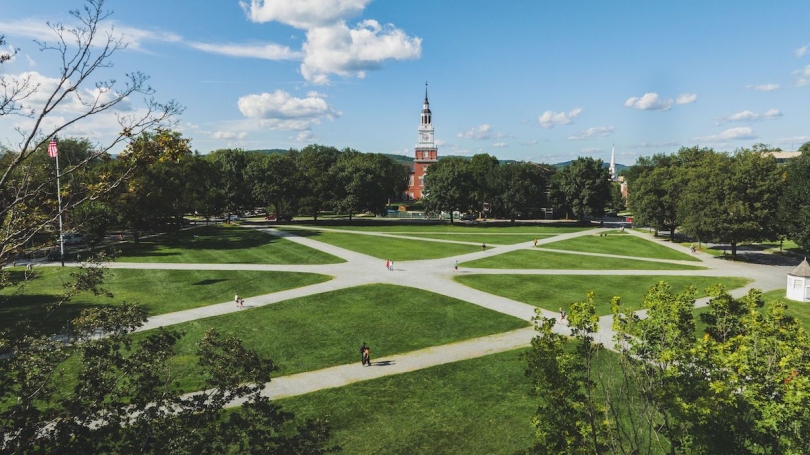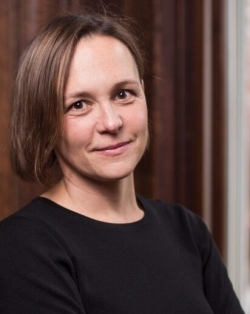

From public lectures on globalization to work illuminating gender inequalities, Dartmouth economists foster public policy discourse about critical contemporary issues.
One day this past school year, economist Nina Pavcnik was strolling through the Mall of America in Minneapolis, a four-story shopping bonanza replete with a 14-theater cinema complex, 1.3-million-gallon aquarium, and 7-acre indoor theme park.
nina_pavcnik_sept_2023_econ_story.jpg
But Pavcnik wasn't there to shop. Rather, the Niehaus Family Professor in International Studies was leading a discussion on how globalization has impacted the largest mall in the Western Hemisphere. It was among many events she conducted this past year as a Phi Beta Kappa visiting scholar who traveled around the country to meet with undergraduates and hold public lectures—one of numerous ways Dartmouth economists have been fostering public policy discourse beyond campus.
"We stand out among the top economics departments in the world not only because our faculty universally work on important, applied global problems," says department chair and professor Eric Edmonds, "but also because of our commitment to communicating our research broadly."
Every member of the Department of Economics can be found tackling important contemporary issues, from professors Na'ama Shenhav's research on undocumented immigrants and education and Steve Mello's work on racial bias in policing to Christopher Snyder's investigation of accelerated vaccine development and Paul Novosad's work informing policy interventions that can help improve the lives of people in developing countries. Professor Heidi Williams, who joined Dartmouth from Stanford in July, studies how society can best support science and innovation and collaborates with several federal agencies on science policy.
"I think Dartmouth students have a lot to do with why we as a department stay focused on important contemporary issues," Edmonds says. "Inside and outside the classroom, students focus us on what is important in the world. They remind us why our research needs to resonate outside the walls of our department, and they teach us how to communicate our insights effectively."
During Pavcnik's three-hour tour with students from nearby St. Catherine University, she journeyed inside the Mall of America's storage facilities and hidden infrastructure, even peering into the control room for the theme park's Log Chute ride, which features a 40-foot-drop into a pool. For Pavcnik, it was a look into how a mall can continue to thrive amid the "retail apocalypse."
"Malls need to continue to come up with ways to provide experiences and services that draw customers to the mall rather than shop online," says Pavcnik, noting how the mall had embraced Instagram as a way of promoting itself in the digital economy, as well as how the mall's famous three-story-tall Lego statue was a benefit of global supply chains, having been built in the Czech Republic.
Gender in the economy and economics profession
In 2020, with Claudia Goldin of Harvard and Seema Jayachandran of Princeton, Professor Claudia Olivetti co-founded a new Gender in the Economy Group within the National Bureau of Economic Research, funded by the Bill and Melinda Gates Foundation.
The group solicits research on the economics of childcare, workplace equity, and domestic violence, among other topics. Their annual conference spotlights that research, and they awarded grants to fund further studies. Olivetti is especially proud to have sponsored work by academics from lower- and middle-income nations in the underrepresented Global South.
"We want to understand women's role and gender inequalities as economies develop," says Olivetti, the George J. Records 1956 Professor of Economics. "Technological, cultural, and institutional factors of course are key in this inquiry, and understanding the deep causes is important for the design and evaluation of policies."
Olivetti also spearheaded the group's creation of a fellowship program for graduate students at the dissertation stage, annually awarding $50,000 apiece to three PhD candidates and providing mentoring and research feedback. Among the inaugural fellows was Ashley Wong '14, a postdoctoral scholar at the Stanford Institute for Economic Policy Research who focuses on labor and gender economics.
elizabeth_cascia_web_article.jpg
Olivetti credits the group with "fostering a rich and inclusive intellectual community interested in the study of issues of gender inequality and women's opportunity and encouraging those doing research on these critical issues to continue their work."
Other colleagues in the department who frequently examine societal change and public policy through the lens of gender include economist Elizabeth Cascio, DeWalt H. 1921 and Marie H. Ankeny Professor in Economic Policy, and Assistant Professor of Economics Na'ama Shenhav. Their 2020 paper in the Journal of Economic Perspectives sheds light on the expanding political gap between men and women in the United States.
"The fact that women have become stronger partisans over time in a way that's different than men seems to suggest that they might be becoming more politically influential," Cascio said in an interview with the American Economic Association about the research.
Dartmouth economists have also been pushing to enhance diversity in their field through the Women in International Economics Conference. Pavcnik helps organize this annual event alongside Assistant Professor of Economics Meredith Startz. Startz co-founded the conference to provide early career female economists an opportunity to present their research and receive feedback and mentorship from senior academics.
Strengthening understanding of international economic policy
Last fall, Pavcnik and John French Professor of Economics Doug Irwin conducted a major review of the International Monetary Fund's research on trade and policy.
doug_irwin_web_article.jpg
A nonresident senior fellow at the Peterson Institute for International Economics, Irwin worked on trade policy issues while on the staff of President Ronald Reagan's Council of Economic Advisers and later worked in the International Finance Division at the Board of Governors of the Federal Reserve System in Washington, D.C.
Alongside Amit Khandelwal of Yale, the Dartmouth economists analyzed more than 200 IMF reports and publications on subjects such asBrexit, the U.S.-China trade war, the COVID-19 pandemic, and the invasion of Ukraine, with the goal of better integrating this research into the agency's policy work.
"I learned many useful institutional details about the policy work in international trade at the IMF through this review," Pavcnik says, adding that she has incorporated some of these findings into her undergraduate course, Topics in International Economics.
This month Pavcnik will deliver the keynote address at the 10th annual Liberal Arts Colleges Development Economics Conference. Her speech will address how young people from low-income countries have been socially impacted by multinational global supply chains.
She says she's excited to represent Dartmouth at the conference.
"Dartmouth's unique teacher-scholar model benefits faculty as well as students, helping us influence the world far beyond our little nook of rural New Hampshire," Edmonds says. "There is no esoteric ivory tower in Hanover."